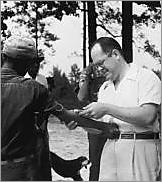
Since it was revealed in 1972, the Tuskegee Study of Untreated Syphilis in the Negro Male has been considered among the most egregious violations of research ethics during the 20th century. The study began in 1932; for 40 years, researchers passively monitored hundreds of adult black males with syphilis, despite the availability of effective treatment. The study was funded by the US Public Health Service (PHS), and only concluded when PHS employees alerted journalists, having been ignored or rebuffed by their employer. A newly published paper outlines the tragic legacy: "the historical disclosure of the study in 1972 is correlated with increases in medical mistrust and mortality and decreases in both outpatient and inpatient physician interactions for older black men." The authors of the study estimate "life expectancy at age 45 for black men fell by up to 1.4 years in response to the disclosure, accounting for approximately 35% of the 1980 life expectancy gap between black and white men." At last December's Consortium-sponsored Research with Human Participants conference, Prof. Vanessa Northington Gamble, MD, PhD (George Washington University) discussed her work as Chair of the federal committee that obtained an official apology for the study from President Bill Clinton in 1997 -- view her talk here.